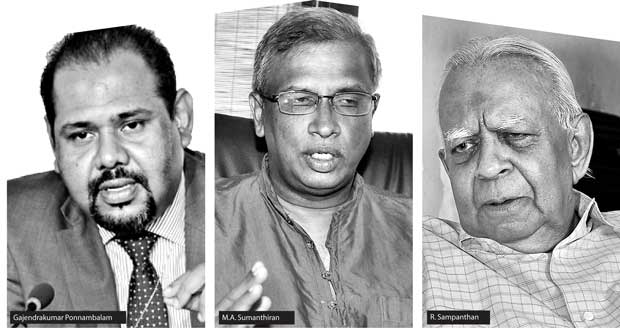Meera Srinivasan / The Hindu.
With a banner sporting a picture of Illankai Tamil Arasu Kachchi (ITAK) founder S.J.V. Chelvanayakam in the background, senior Tamil leader R. Sampanthan made a fervent appeal in an election rally in Jaffna. “Unity”, he said, “is the only weapon we have now.”
Days ahead of Sri Lanka’s February 10 local government polls, the 85-year-old politician urged the northern Tamils to speak in one voice and support the ITAK. Whether it was the Northern Provincial Council elections in 2013, or the parliamentary elections of August 2015, the voters had done just that, giving the party and the Tamil National Alliance it helms an overwhelming mandate. “You placed your trust on us, and no one else, to be your representative. Give us a chance to continue to do that work,” Mr. Sampanthan said.
The party and its allies secured a majority of the local bodies in the north, but not without a contest. The outcome was a clear indication that the ITAK cannot take its traditional support base for granted any more. The Eelam People’s Democratic Party (EPDP) of Douglas Devananda and a revived Akila Ilankai Tamil Congress (AITC) or the All Ceylon Tamil Congress have made notable inroads in the islands off Jaffna peninsula and in urban councils in Jaffna, respectively.
The EPDP is known to have considerable backing in the islands, especially among people of the oppressed castes, a constituency that sees the ITAK as elitist and distant. While being the most popular party in the north, the ITAK — which has in the past been indulgent towards Tamil militant groups — is also accused of leaning more towards dominant caste groups in the region. All the same, the EPDP openly aligned with President Mahinda Rajapaksa and some of his predecessors during the years of war and soon after, losing credibility among many Tamils.
Significant gains
Leading his grandfather G.G. Ponnambalam’s AITC, lawyer-politician Gajendrakumar Ponnambalam has captured a share of the support from Jaffna’s youth and professionals. Though small, the party’s gain in this election is significant, especially after the severe beating it took in the 2015 parliamentary elections. In addition to adopting a stridently Tamil nationalist rhetoric, the AITC has been trying to mobilise families that await the return of their land in military occupation, and the relatives of missing persons, besides voicing frequent opposition to the TNA’s policies.
Apparently responding to its critique, the TNA’s Jaffna district parliamentarian M.A. Sumanthiran said in the same pre-election rally that different strategies were needed for different times. “When it’s a running race, you run forward in order to win. But when it’s a tug of war, you might have to manoeuvre differently, at times taking a few steps backward and then forward,” he said. Even if the reasons for the election outcome are not clear yet, there are some in the north who see the AITC’s entry into local government bodies as a welcome addition to the ITAK-dominated political landscape in the north, but others worry that this might push the ITAK to a more nationalist platform. It remains to be seen if the election outcome might impact the ideology or strategy of any of these parties.
The crowd at the Jaffna rally, in Sangiliyan Thoppu — a park in the suburb of Nallur, named after the last king of Jaffna — was not particularly huge. But one message from Mr. Sampanthan seemed to resonate with the audience. “We [Tamils] have lost many opportunities in the past, we can’t afford to lose one more.”
Image courtesy of The Daily Mirror.
